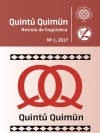Inacusativos en el inglés L2 de hispanohablantes: qué nos dicen los errores sobre la representación mental y las intuiciones de esos hablantes / Unaccusatives in L2 English by Spanish-speakers: what errors reveal about the speakers’ mental representation and intuitions
Contenido principal del artículo
Resumen
Este trabajo discute la realización del sujeto en inglés como Lengua Segunda en casos de mapeos no canónicos entre roles temáticos y funciones sintácticas, específicamente en estructuras inacusativas. La lengua materna de los alumnos en este estudio es español, la que difiere del inglés en dos aspectos cruciales: (i) en inglés, a diferencia del español, el sujeto es explícito, y (ii) en oraciones declarativas el sujeto precede al verbo, mientras que el español permite sujetos posverbales en algunos casos, particularmente en oraciones inacusativas y pasivas. Examinaremos esta cuestión por medio de dos tareas experimentales: una sobre juicios de gramaticalidad y otra sobre traducción inversa. El propósito final es explorar la relación entre los errores y las intuiciones lingüísticas de los alumnos, así como el papel de una enseñanza basada en el análisis lingüístico.
Palabras clave: inacusativos, roles temáticos y funciones sintácticas, adquisición de la segunda lengua
ABSTRACT
This paper addresses the realisation of the subject in L2 English in a case of non-canonical mapping between theta roles and syntactic functions, specifically in the case of unaccusatives. The learners’ L1 is Spanish, which differs from English in two crucial respects: (i) in English, as opposed to Spanish, the subject is obligatorily overt, and (ii) in English, declarative sentences the subject precedes the finite verb, while Spanish allows for postverbal subjects in some cases, notably with unaccusatives and passives. We will examine the issue by means of a grammaticality judgment and a translation task. The final aim is to explore the relation between errors and linguistic intuitions of the learners, as well as the importance of linguistically informed teaching.
Keywords: unaccusatives, thematic roles and syntactic functions, second language acquisition
Descargas
Detalles del artículo
Los autores de los artículos publicados conservan los derechos de copyright.
Licencia de uso:

Creative Commons Atribución-NoComercial-CompartirIgual 4.0 Internacional.
Citas
Alboiu, Gabriela (2001) The features of movement in Romanian. Editura Universitati din Bucuresti. Tesis doctoral.
Baker, Mark (1988) Incorporation: a theory of grammatical function changing. Chicago: University of Chicago Press.
Baker, Mark (1997) Thematic roles and syntactic structure. En L. Haegeman (ed.), Elements of Grammar. Dordrecht: Kluwer. 73-137.
Balcom, Patricia (1997) Why is this happened? Passive morphology and unaccusativity. Second Language Research, 13: 1–9.
Berwick, Robert, Paul Pietroski, Beracah Yankama & Noam Chomsky (2011) Poverty of stimulus revisited. Cognitive Science, 35: 1207-1242.
Burzio, Luigi (1981) Intransitive verbs and Italian auxiliaries. Tesis Doctoral. MIT.
Burzio, Luigi (1986) Italian Syntax. Dordrecht: Reidel.
Chomsky, Noam (1981) Lectures on Government and Binding. Dordrecht: Foris.
Chomksy, Noam (1995) The Minimalist Program. Cambridge, Massachusetts: MIT Press
Chomsky, Noam (1998) Minimalist inquiries: the framework. MIT OPL 15. Depto. de Lingüística, MIT.
Hirakawa, Makiko (1995) L2 acquisition of English unaccusative constructions. En: D. MacLaughlin & S. McEwen (eds.). Proceedings of the 19th Boston University Conference on Language Development: 291-302. Somerville, MA: Cascadilla Press.
Lardiere, Donna (2008) Feature assembly in second language acquisition. En Liceras, J. et al (Eds.). The role of formal features in second language acquisition. 107-140. New York: Lawrence Erlbaum.
Lozano, Cristóbal. & Mendikoetxea, Amaia. (2010) Postverbal subjects in L2 English: A corpus-based study. Bilingualism: Language and Cognition, 13(4): 475–497.
Oshita, Hiroyuki (1997) The Unaccusative Trap in Second Language Acquisition. Tesis doctoral. University of Southern California.
Oshita, Hiroyuki (2000) What is happened may not be what appears to be happening: a corpus study of ‘passive’ unaccusatives in L2 English. Second Language Research, 16: 293-324.
Oshita, Hiroyuki (2001) The Unaccusative Trap in Second Language Acquisition. Studies on Second Language Acquisition, 23: 279–304, Cambridge: CUP.
Picallo, María Carme (1999) Rasgos sintácticos y posiciones argumentales en catalán. Ms.Universitat Autònoma de Barcelona.
Simonovikj, Aleksandra (2011) Second language acquisition of unaccusative syntax: Macedonian and Spanish learners of L2 English. Tesis de maestría, Universidad de Granada.
Sorace, Antonella & Ludovica Serratrice (2009) Internal and external interfaces in bilingual language development: Beyond structural overlap. International Journal of Bilingualism, 13 (2): 195–210.
Tsimpli, Ianthi M. y María Mastropavlou (2008) Feature interpretability in L2 acquisition and SLI: Greek clitics and determiners. En Liceras, J.M., Zobl, H. y Goodluck, H. (Eds.). The role of formal features in second language acquisition. 142-183. New York, NY: Lawrence Erlbaum Associate.
VanPatten, Bill (2010) The Two Faces of SLA: Mental Representation and Skill. En International Journal of English Studies, 10 (1): 1-18.
VanPatten, Bill (2013) Aptitude as grammatical sensitivity: recent research on processing instruction. En: Sanz, C., Lado, B. y Bourns S. (Eds.) Individual differences, L2 development and Language Program Administration: from theory to application.
VanPatten, Bill & Jason Rothman (2014) Against “rules”. En: Benati, A., Laval, C. and Arche, M. (eds.) The grammar dimension in instructed second language learning. Advances in instructed second language acquisition research. Bloomsbury Academic, London. ISBN 9781441162045.
Yip, Virginia (1995) Interlanguage and learnability: from Chinese to English. Amsterdam: John Benjamins.
Yuan, Boping (1999) Acquiring the unaccusative/unergative distinction in a second language: Evidence from English-speaking learners of L2 Chinese. Linguistics, 37: 275-296.
Zobl, Helmut (1989) Canonical typological structures and ergativity in English L2 acquisition. En Susan Gass y Jacqueline Schachter, Linguistic perspectives on second language acquisition. Cambridge: C.U.P
